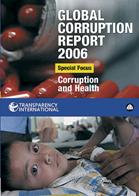|
|
Corruption in Health Care Costs Lives
The Lancet
World
February 11, 2006

In recent years, newspaper business pages have been full of examples of corruption and criminal business practices that led to the enrichment of a few greedy individuals. Some, like the UN oil-for-food scheme, in which Kofi Annan's son Kojo was sadly implicated, had direct effects on people's wellbeing and livelihoods. Yet, one enormous business affecting everyone's life, the health-care sector, which is worth an estimated US$3 trillion per year worldwide and which is mostly funded by taxpayers' money, is strangely exempt from close scrutiny. Very little is known about the extent to which corruption affects health-care systems and providers. The word corruption-abuse of entrusted power for private gain-rarely enters health professionals' vocabulary and is frequently softened to unethical or unprofessional behaviour.
In its annual Global Corruption Report 2006, released on Feb 1, the non-governmental organisation Transparency International shines a spotlight on the health-care sector and concludes that corruption permeates the provision of health care at all levels and in all countries. The health sector is particularly prone to corruption, argues the report, as it constitutes a maze of complex and opaque systems that provide a fertile ground for malfeasance. Transparency International's focus on health is a welcome wake-up call for both developed countries, which are grappling with spiralling health-care costs and increasingly impossible budget control, and for developing countries, which are ravaged by preventable and treatable diseases. Corruption, argue the report's authors, is one of the main reasons why the global community is off target to achieve the health-related Millennium Development Goals.
What is the scale of the problem? In terms of financial costs, it is impossible to state an exact figure, but the estimate goes into tens of billions of dollars per year. The spectrum of corruption ranges from physicians with conflicts of interest advocating a particular treatment for the wrong reasons to aggressive marketing strategies by pharmaceutical companies; from underpaid health workers accepting small bribes from patients to the provision of ineffective counterfeit drugs; from large-scale embezzlement of public-health funds to massive distortions of health policy and funding by corrupt government officials.
The struggle with HIV/AIDS in developing countries is highlighted as a particular area of concern. Large amounts of aid money are pouring into countries with wholly inadequate health resources and a lack of infrastructure, sometimes doubling their budgets. Assessment of funding and programme success in terms of health outcomes is patchy at best.
The report, however, does not only describe this alarming picture but also includes examples of encouraging steps taken by some countries. Jim Gee, the UK National Health System anti-fraud unit's Chief Executive, explains in the report how his unit has stopped corruption in the NHS of more than £170 million since its inception in 1998. Following a first conference on health-care fraud in 2004 in London, the European Healthcare Fraud and Corruption Network based in Brussels has been created with the aim of coordinating health-care counter-fraud and corruption work across Europe. In Nigeria, the National Agency for Food and Drug Administration has achieved some success in combating the problem of counterfeit drugs by lobbying for a strong regulatory environment and conducting public awareness campaigns, according to its current director general Dora Akunyili.
However, there is much to do and the report ends with sensible, and in part hard-hitting, recommendations. Any cure should start with maximum transparency. Donor and recipient governments need to grant easy access to information on health-related projects, budgets, and policies to allow independent and public audits. Codes of conduct need to be adopted by health workers and private sector companies. In this context, the recommendation goes as far as prohibiting physicians from advocating drugs or devices they have a financial interest in and from taking part in speakers' bureaus funded by pharmaceutical companies. Public-health policies should be independently monitored at national and international level and these reports need to be publicly available. Procurement processes should be competitive and transparent. Any transgressions have to be rigorously prosecuted. Whistleblowers from all sectors should be protected.
These welcome recommendations should be taken seriously by all involved and mechanisms should be established to strive towards achieving them. By doing so not only enormous amounts of money but also many lives could be saved.
|
|



